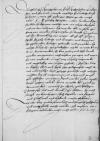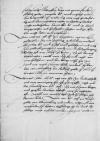Uns ÿst gestriges thages gen der nacht Ewer(r) F(urstlichen) D(urchlauch)t gunstig ⌊⌋ / neben den dennischen hendlen zu khomen, / welche wir mit vleÿs uberlesen / und mit den andrenn, / dÿ uns der edle, ernfeste her(r) ⌊Hans von Werden⌋, burgemeÿster zu ⌊Dantzke⌋, hawptman uff der ⌊Newenburg⌋, von wegen E(wer) F(urstlichen) D(urchlauch)t zu geschickt, / fleÿssig bedacht und bewogen / und dorynnen(n) dÿ geswinden ferlichen gelewffte und practiken, / dÿ welche durch dÿ burgundischen wÿder ⌊erwelte ko(niglich)e wirde in Dennemarcken⌋, / dÿ ⌊Kron Polen⌋ / und ⌊dÿse lande⌋ werden vorgenomen, / noch unserm geringen und unerfarnem vorstande, / so vÿl uns muglich, angemerckt und weÿtlofftig vor augen gestaldt. / Befinden, das in dÿsem fhal / und dÿser zeÿt gelegenheÿt nach, / domit mutwÿllige, boese, geÿtzige gemuethe nicht voltzihen mochten, / das sy vorgenomen, / mit vleys und ernst gut uffsehen vonothenn / und mit den ersten wirglich darzu gethan wurd, / domit ⌊erwelte ko(niglich)e wird in Dennemarcken⌋, / nemlich in dysem gluckseligen ( Gotthe seÿ lob und danck ) zu fellen, / dÿ nicht lengst vor ⌊Kopenhagen⌋ sych begeben, / mit stewer(r) und hulff, / trost und beÿstandt mochte uberkomen(n). /
Wÿ aber das unvorsewmlich und fueglich geschenn(n) / und vortgesteldt mocht werden, / ÿst unserm einfeltigem beduncken nach / nicht allein furderlich, /  GStA, PK, HBA, C 2, No 109, f. 2v sunder auch nottorfftig, / das mit eÿnner starckenn(n) sum(m)en gelts / ⌊erwelte ko(niglich)e wird⌋ entsetzt wurd, / das kriegvolck / zu eruberung, was noch hinderstellig, / und darnach etwas weÿter ein zeÿtlang beÿ sych mochte underhalten, / domit er(welte) ko(niglich)e wird in seynen(n) konnigreychen und herschafften sycher / und in fester rue mocht leben und pleÿbenn(n). /
GStA, PK, HBA, C 2, No 109, f. 2v sunder auch nottorfftig, / das mit eÿnner starckenn(n) sum(m)en gelts / ⌊erwelte ko(niglich)e wird⌋ entsetzt wurd, / das kriegvolck / zu eruberung, was noch hinderstellig, / und darnach etwas weÿter ein zeÿtlang beÿ sych mochte underhalten, / domit er(welte) ko(niglich)e wird in seynen(n) konnigreychen und herschafften sycher / und in fester rue mocht leben und pleÿbenn(n). /
Dem nach, wÿ E(wer) D(urchlauch)t thut antzeÿgen, / wÿ von hove geschrÿben, / das mit zceÿtung(en) und andren vorslegen(n) ⌊erwelter ko(nigliche)r wird⌋ hulff wird gebethenn(n) / und wan(n)s zum gelde sol gerathenn(n) werden, / wirdt stÿl geswiegen, / etc. Solchs ÿst uns auch zu komen. / So yst dennoch hochvo(n)noten, / wolle wir dÿ feynnde weÿt von uns halthenn / und den krieg nicht hie im ⌊land⌋ mit unser armen ⌊leudt⌋ vorderb haben, / das wir samptlich ein stadlich geldt zu same(n) zu brengen alle ein vernemen hetten. /
Dÿweÿl aber E(wer) D(urchlauch)t, wÿ wir ⌊hie im lande⌋ geschickt / und was vormugens hie ÿst, / gut wÿssen tregt / und das swerlich von ⌊ko(nigliche)r m(aieste)t⌋, dÿ mit sweren krigen / und grosser darlege behafft, / was zu erhalthen ÿst, / wÿsse wir warlich dÿse zeydt zu solcher eÿle keynnen radt. / Wer von ⌊ko(nigliche)r m(aieste)t⌋ ein sum(m)a gelds von ⌊Marienburg⌋ und andern orthern, / so was vorhanden, / zu bytten, / byssolange ⌊hÿ im land⌋ dÿ selbtige mocht erstalet werden, / hirynne woldt wir  GStA, PK, HBA, C 2, No 109, f. 3r neben andren ⌊dÿs lands stenden⌋ uns gerne lassen brawchen. / Wir besorgen uns aber, / es werde swerlich wollen zu langen. / Es weÿs zu guther mass E(wer) D(urchlauch)t, wÿ ein hochvorstendiger furst, / am hove und hÿ, / wÿ unsere sachen ein gestaldt habenn(n). /
GStA, PK, HBA, C 2, No 109, f. 3r neben andren ⌊dÿs lands stenden⌋ uns gerne lassen brawchen. / Wir besorgen uns aber, / es werde swerlich wollen zu langen. / Es weÿs zu guther mass E(wer) D(urchlauch)t, wÿ ein hochvorstendiger furst, / am hove und hÿ, / wÿ unsere sachen ein gestaldt habenn(n). /
Wir sein aber vor uns selbst uberbittig und wÿllig, / wÿ wir dan alweg zuvor ⌊ko(nigliche)r erwelter wird⌋ und E(wer) F(urstlichen) D(urchlauch)t mit der selbtigen vorwanthen alweg gewest, / alle das jennige noch unserm armen vormugen zu thun, / so hirynne uns dis falsz E(wer) D(urchlauch)t wirdt wollen gebrauchen, / das uns um(m)er muglich etc. Dÿ zeÿt und not fordert, das wir uns allen ⌊hie im land⌋ selbst nicht abstunden. / Wer eyn ÿder des gemuets, wÿ wir ( das wir unrumlich allein der noth nach von uns vorstanden wollen haben ) dem ermanen, das gunstiger weis an uns E(wer) D(urchlauch)t thudt, / wer wol zu helffen. / Byttn dÿselbtige unser trewhertzige meÿnung E(wer) D(urchlauch)t freuntlich in angefangner gunst gen uns / wolde uffnhemenn(n). /
Das freuntlich und fast gunstig entschuldig(en), / das E(wer) D(urchlauch)t gethan / von wegen das ein zeÿt lang zu schreÿben untherlassen, / ÿst unnotig. / Uns yst unvorborgen, das dÿ, mit vÿl mehren und hoern geschefften beladen, / nicht alweg uff unser unnutz schreyben muge antwurthen. / So ÿst dennoch nicht  GStA, PK, HBA, C 2, No 109, f. 3v wennigers, / wÿ zuvor etlich mal gescheh written over ry⌈ryeheh written over ry⌉enn(n), / unser gantz freuntlich und vleÿssig byt vor unsernn(n) armen man und hie unsern burger meÿster ⌊Symon⌋ den maler, / das er uff dem guthe ⌊Rapten⌋ im ⌊Osterrodischenn⌋ gelegen, / doruff er III-C mar(cas), / wÿ hie in unserm stadtbuch vortzeychenndt, / seynnes ⌊weybs⌋ vorigen manne geligen, / mochte bleÿbenn / und das ihm sein vyhe, das uff Osterrode dovon getrÿben, / mochte wÿder werden. /
GStA, PK, HBA, C 2, No 109, f. 3v wennigers, / wÿ zuvor etlich mal gescheh written over ry⌈ryeheh written over ry⌉enn(n), / unser gantz freuntlich und vleÿssig byt vor unsernn(n) armen man und hie unsern burger meÿster ⌊Symon⌋ den maler, / das er uff dem guthe ⌊Rapten⌋ im ⌊Osterrodischenn⌋ gelegen, / doruff er III-C mar(cas), / wÿ hie in unserm stadtbuch vortzeychenndt, / seynnes ⌊weybs⌋ vorigen manne geligen, / mochte bleÿbenn / und das ihm sein vyhe, das uff Osterrode dovon getrÿben, / mochte wÿder werden. /
Vor das geneygt und gunstig erbiethen gen uns, in superinscribed, in the hand of Dantiscus⌈inin superinscribed, in the hand of Dantiscus⌉ dem zcedel beschrÿben, / thue wir E(wer) D(urchlauch)t uff das aller hochste und freuntlichste bedancken. / Tragen auch keynen zweÿffel, / so wÿr worynnen / uns zu ehren und hoerm stande / E(wer) D(urchlauch)t rodt und hulff theten anruffen, / das dÿ selbige E(wer) D(urchlauch)t, wÿ unser hoch gunstiger her und freundt, / uns nicht wurd vorlassen. / Wollen uns auch so alweg gen E(wer) D(urchlauch)t halthen, ( wÿ es dan Got mit uns machen wÿll ) das E(wer) D(urchlauch)t uns stets wÿlferig, / zu freuntlichem dinst und wolgefallen sol haben, / dan noch all unserm vormuegen E(wer) D(urchlauch)t, / in der gunst wyr uns befolhenn(n), / vÿl geflysner, nutzlicher und nachbarlicher dinst zu  GStA, PK, HBA, C 2, No 109, f. 4r thun sein wÿr wÿllig. /
GStA, PK, HBA, C 2, No 109, f. 4r thun sein wÿr wÿllig. /
 GStA, PK, HBA, C 2, No 109, f. 4v
GStA, PK, HBA, C 2, No 109, f. 4v  GStA, PK, HBA, C 2, No 109, f. 2r
GStA, PK, HBA, C 2, No 109, f. 2r  GStA, PK, HBA, C 2, No 109, f. 2v sunder auch nottorfftig, / das mit eÿnner starckenn(n) sum(m)en gelts /
GStA, PK, HBA, C 2, No 109, f. 2v sunder auch nottorfftig, / das mit eÿnner starckenn(n) sum(m)en gelts /  GStA, PK, HBA, C 2, No 109, f. 3r neben andren
GStA, PK, HBA, C 2, No 109, f. 3r neben andren  GStA, PK, HBA, C 2, No 109, f. 3v wennigers, / wÿ zuvor etlich mal gescheh written over ry⌈ryeheh written over ry⌉enn(n), / unser gantz freuntlich und vleÿssig byt vor unsernn(n) armen man und hie unsern burger meÿster
GStA, PK, HBA, C 2, No 109, f. 3v wennigers, / wÿ zuvor etlich mal gescheh written over ry⌈ryeheh written over ry⌉enn(n), / unser gantz freuntlich und vleÿssig byt vor unsernn(n) armen man und hie unsern burger meÿster  GStA, PK, HBA, C 2, No 109, f. 4r thun sein wÿr wÿllig. /
GStA, PK, HBA, C 2, No 109, f. 4r thun sein wÿr wÿllig. /





